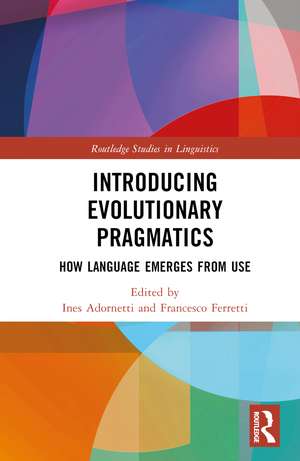Introducing Evolutionary Pragmatics: How Language Emerges from Use: Routledge Studies in Linguistics
Editat de Ines Adornetti, Francesco Ferrettien Limba Engleză Hardback – 19 noi 2024
The volume adopts a broad view of pragmatics, providing a counterpoint to classical models of language evolution by exploring the ways in which the origins of language can be traced through the emergence of language structures from use in context. The book synthesizes different lines of inquiry, ranging from evolutionary linguistics to cognitive linguistics, philosophy, and cognitive pragmatics, among other fields, which foreground the impact of the environment on language and of language, through speaker use, on context. The volume is organized around three sections, each taking in turn a different dimension of evolutionary pragmatics research; the origins of language as seen in animal communication; a closer look at the use of language in interaction for the formation of communication channel and linguistic meaning; the role of cooperation and competition dynamics for the emergence of language structure.
This book will be of particular interest to scholars in evolutionary linguistics, language origins, cognitive pragmatics, cognitive archaeology, and cognitive semiotics, as well as related areas in philosophy, psychology, and anthropology.
Din seria Routledge Studies in Linguistics
-
 Preț: 311.76 lei
Preț: 311.76 lei - 9%
 Preț: 936.57 lei
Preț: 936.57 lei -
 Preț: 293.95 lei
Preț: 293.95 lei -
 Preț: 238.40 lei
Preț: 238.40 lei -
 Preț: 358.19 lei
Preț: 358.19 lei - 18%
 Preț: 1115.51 lei
Preț: 1115.51 lei -
 Preț: 309.27 lei
Preț: 309.27 lei - 18%
 Preț: 1007.86 lei
Preț: 1007.86 lei -
 Preț: 397.32 lei
Preț: 397.32 lei -
 Preț: 416.22 lei
Preț: 416.22 lei - 18%
 Preț: 1008.17 lei
Preț: 1008.17 lei - 18%
 Preț: 1108.73 lei
Preț: 1108.73 lei - 18%
 Preț: 296.19 lei
Preț: 296.19 lei -
 Preț: 380.52 lei
Preț: 380.52 lei -
 Preț: 428.67 lei
Preț: 428.67 lei - 18%
 Preț: 1010.95 lei
Preț: 1010.95 lei -
 Preț: 393.46 lei
Preț: 393.46 lei -
 Preț: 389.66 lei
Preț: 389.66 lei -
 Preț: 387.20 lei
Preț: 387.20 lei - 18%
 Preț: 999.51 lei
Preț: 999.51 lei - 18%
 Preț: 1006.60 lei
Preț: 1006.60 lei -
 Preț: 486.22 lei
Preț: 486.22 lei -
 Preț: 449.41 lei
Preț: 449.41 lei - 18%
 Preț: 1007.36 lei
Preț: 1007.36 lei -
 Preț: 412.79 lei
Preț: 412.79 lei - 21%
 Preț: 138.15 lei
Preț: 138.15 lei -
 Preț: 382.91 lei
Preț: 382.91 lei -
 Preț: 389.66 lei
Preț: 389.66 lei - 18%
 Preț: 1003.30 lei
Preț: 1003.30 lei -
 Preț: 384.86 lei
Preț: 384.86 lei - 15%
 Preț: 489.26 lei
Preț: 489.26 lei - 18%
 Preț: 997.90 lei
Preț: 997.90 lei -
 Preț: 462.60 lei
Preț: 462.60 lei - 18%
 Preț: 1000.27 lei
Preț: 1000.27 lei - 18%
 Preț: 1165.20 lei
Preț: 1165.20 lei
Preț: 944.56 lei
Preț vechi: 1151.90 lei
-18% Nou
Puncte Express: 1417
Preț estimativ în valută:
180.76€ • 196.28$ • 151.84£
180.76€ • 196.28$ • 151.84£
Carte tipărită la comandă
Livrare economică 23 aprilie-07 mai
Preluare comenzi: 021 569.72.76
Specificații
ISBN-13: 9781032482460
ISBN-10: 103248246X
Pagini: 240
Ilustrații: 2
Dimensiuni: 152 x 229 mm
Greutate: 0.42 kg
Ediția:1
Editura: Taylor & Francis
Colecția Routledge
Seria Routledge Studies in Linguistics
Locul publicării:Oxford, United Kingdom
ISBN-10: 103248246X
Pagini: 240
Ilustrații: 2
Dimensiuni: 152 x 229 mm
Greutate: 0.42 kg
Ediția:1
Editura: Taylor & Francis
Colecția Routledge
Seria Routledge Studies in Linguistics
Locul publicării:Oxford, United Kingdom
Public țintă
PostgraduateCuprins
Contents
List of Contributors
Introduction: What is evolutionary pragmatics? (Ines Adornetti & Francesco Ferretti)
Part I: Animal communication
Chapter 2: Animal signalling between informing and influencing: setting the stage for a pragmatic-rhetorical model of communication (Ines Adornetti)
Chapter 3: The cognitive foundations of ostensive-inferential communication: Insight from the study of non-human primates’ communication (Alessandra Chiera)
Part II: Communication channel and meaning construction
Chapter 4: The Role of Communication Channel in the Emergence of Novel Communication Systems in Experimental Semiotics (Michael Pleyer, Angelo D. Delliponti, Svetlana Kuleshova, Marek Placiński, Renato Raia, Giulia Sanguedolce, Marta Sibierska)
Chapter 5: A Usage-Based Perspective on Evolutionary Pragmatics (Michael Pleyer & Stefan Hartmann)
Part III: Cooperation and competition in the emergence of language structure
Chapter 6: A four-stage model of the co-evolution of hominin cooperation and communication (Jordan Zlatev, Aaron Stutz & Przemyslaw Żywiczyński).
Chapter 7: Agonistic Conversation. A cognitive-interactive perspective on the origin of grammar. (Francesco Ferretti)
Chapter 8: The role of early expressive uses of language in brain and language evolution (Antonio Benítez-Burraco & Ljiljana Progovac)
Index
List of Contributors
Introduction: What is evolutionary pragmatics? (Ines Adornetti & Francesco Ferretti)
Part I: Animal communication
Chapter 2: Animal signalling between informing and influencing: setting the stage for a pragmatic-rhetorical model of communication (Ines Adornetti)
Chapter 3: The cognitive foundations of ostensive-inferential communication: Insight from the study of non-human primates’ communication (Alessandra Chiera)
Part II: Communication channel and meaning construction
Chapter 4: The Role of Communication Channel in the Emergence of Novel Communication Systems in Experimental Semiotics (Michael Pleyer, Angelo D. Delliponti, Svetlana Kuleshova, Marek Placiński, Renato Raia, Giulia Sanguedolce, Marta Sibierska)
Chapter 5: A Usage-Based Perspective on Evolutionary Pragmatics (Michael Pleyer & Stefan Hartmann)
Part III: Cooperation and competition in the emergence of language structure
Chapter 6: A four-stage model of the co-evolution of hominin cooperation and communication (Jordan Zlatev, Aaron Stutz & Przemyslaw Żywiczyński).
Chapter 7: Agonistic Conversation. A cognitive-interactive perspective on the origin of grammar. (Francesco Ferretti)
Chapter 8: The role of early expressive uses of language in brain and language evolution (Antonio Benítez-Burraco & Ljiljana Progovac)
Index
Notă biografică
Ines Adornetti is Associate Professor of Philosophy of Language and Language Disorders at Roma Tre University, Italy.
Francesco Ferretti is Full Professor of Philosophy of Language and Cognitive Sciences at Roma Tre University, Italy.
Francesco Ferretti is Full Professor of Philosophy of Language and Cognitive Sciences at Roma Tre University, Italy.
Descriere
This collection highlights a range of perspectives on the emerging body of research on evolutionary pragmatics, expanding the borders of language evolution research and indicating exciting new directions for the future of the field.
